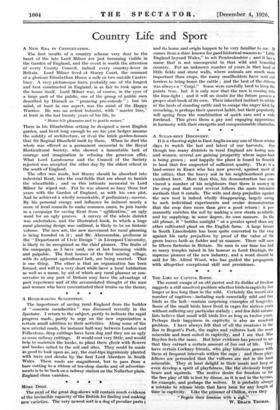THE LIFE OF CAPTIVE BIRDS.
The recent escape of an old parrot and its dislike of freedom suggests a still unsolved problem whether birds in captivity live longer or less long than in the wild. Certainly the record of a number of captives—including such essentially wild and free birds as the lark—contain. surprising examples of longevity. Some of the small birds have lived in cages for sixteen years without suffering any particular malady ; and few field natura- lists believe that small wild birds live as long as twelve years. Perhaps their happiness in captivity is also an unsolved problem. I have always felt that of all the creatures in the Zoo in Regent's Park, the eagles and vultures look the most miserable and least suited to captivity, and I see that Miss Boyden feels the same. But later evidence has" proved to me that they extract a certain amount of fun out of life. They have certain Cockney friends, who play hilarious games with them at frequent intervals within the cage ; and these play-. fellows arc perSuaded that the vultures are not in the least miserable. They at least delight in their meals and keep or even develop a spirit of playfulness, like the obviously happy bears and squirrels. The restive desire for freedem or for the free play of life is lost by disuse, as it is not in the hyenas, for example, and perhaps the wolves. It is probably always a mistake to release birds that have been for any length of time in captivity. Like the prisoner of Chinon, even they
" Regain their freedom with a sigh."
W. BEACH THOMAS.






























































 Previous page
Previous page